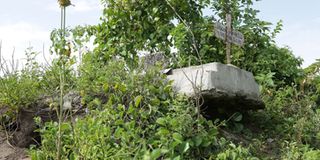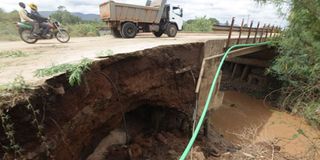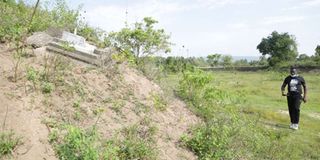Premium
Raila, Oburu, Nyong'o not spared by ruthless sand harvesters of Kisumu

A sand harvester docks on the shores with his product at Usoma beach in Kisumu on December 17, 2020.
''Floating graves'', ruined roads, deep gullies among others are the telltale signs of a trail of destruction left behind by sand harvesters in parts of Kisumu County, with some of the most powerful figures in Nyanza region falling victim to them, albeit silently.
They use threats, bribe relevant agencies dealing in regulation of their activities as they openly flout the ban on sand harvesting.
So daring are the excavators, who are sometimes armed, that they have extended their activities into properties owned by prominent personalities in the region.
For instance, properties belonging to ODM chief Raila Odinga, his elder brother Dr Oburu Oginga, former Nairobi Governor Dr Evans Kidero, Kisumu politicians Ojwang’ Kombudo and Don Riaroh have fallen prey to the illegal excavation activities in Usoma area. Not even Kisumu Governor Anyang’ Nyong’o has been spared.
The practice is rampant in Kanyakwar, Nyando, Usoma and Kisumu West areas where those involved have been issued with restoration orders.
From wanton destruction of the environment, disturbing the dead through harvesting sand near graves, to eating up parcels of land along the lake’s shores, the harvesters are wreaking havoc in Usoma area around the Kisumu International Airport.
The activity is now a source of conflict between beachfront landowners and the excavators who are accused of targeting shoreline sand deposits instead of scooping deposits in the lake bed.
The Nation visited some of the affected areas last week and the destruction was evident, especially in Usoma. Some villagers have had to relocate to other places after the earth was dug up around their homes, leaving their compounds sunken.

A grave stone which was left "floating" in Usoma, Kisumu County after the sand around it was removed by harvesters. .
Graves targeted
The dead are also not resting in peace, as sand around graves is scooped leaving them ''floating''.
Roads have had to be rebuilt by the county government and gabions put on the sides to strengthen them after excavators dug up all sand from the sides.
Mr Vincent Riaroh took us round his family’s five-acre parcel of land. Out of this, illegal sand harvesting has eaten up about two-and-a-half acres.
Together with other property owners, his father is contemplating suing the county government for allowing the illegal excavation to continue.
“We will be going to court to seek compensation for the destruction we have witnessed here and for failure by the county government to take action against the excavators,” said Mr Riaroh.
He told the Nation that he adhered to the environmental laws and even kept 30 metres away from riparian land, yet excavators have now eaten up the remaining shoreline.
“I wonder whether they are going to do fresh demarcations and tell me to move a further 30 metres into my parcel of land which has gone to the sand harvesters and now the lake water is occupying part of it,” said Mr Riaroh.

A nearly-collapsing bridge on River Kibos in Kisumu. Residents have blamed soil erosion and illegal sand harvesting for the collapse.
The lake connection
So who are these harvesters and why is there an uptick in the illegal activity in the lake region? According to some, the practice can be linked to economic disempowerment of young men in the county and Kisumu’s rapid urbanisation.
Faced with dwindling fish stocks in Lake Victoria, sand harvesting, even from the lake itself, has become an alternative source of livelihood for many youths.
“We have been scooping sand from deep in the lake. The landowners accuse us yet it is them who showed us how to do it. But again we don’t have any other job apart from this,” said Mr Christopher Ochieng, a sand harvester.
He revealed that they are paid Sh60 per trip, while those who buy from them sell one heap of sand, which is almost two trips, at Sh1,500.
This illegally obtained raw material is then used to feed the ongoing construction boom linked to rapid urbanisation being experienced in Kisumu.
On behalf of the affected landowners of Usoma village and all riparian areas, the founder of MAGNAM environmental network, Mr Michael Nyaguti, called for urgent intervention from Kisumu County Director of Environment (Nema) Mr Tom Togo, the City Manager Mr Abala Wanga, the county government, the official in charge of Kenya Coast Guard-Western Region, Captain Odera, and County Commissioner Kisumu Ms Josephine Ouko.
“We want these agencies to act swiftly so as to arrest a likely breakout of violence in these areas. If allowed to continue without control, destruction of shoreline vegetation further threatens fish breeding grounds and will likely escalate the human-wildlife conflict,” said Mr Nyaguti.
There are also claims that police and provincial administration officers are compromised, allowing the illegal trade to thrive.

Some of the “floating graves on one of the beach plots along Usoma beach in Kisumu. Unscrupulous sand harvesters have been blamed for this state of affairs.
In January this year, Nema banned sand harvesting in Kisumu to control wanton destruction of the environment. Sand harvesters were issued with environmental restoration orders and were required to apply for licences from the County Environment Committee before being allowed to operate.
Mr Togo of Nema said the agency was working in collaboration with the county government and Ministry of Interior to enforce the directive, warning those who flout the ban of dire consequences, including up to four years in jail, a fine not exceeding Sh2 million, or both.
He said sand harvesting on roads and along power lines has left electrical posts hanging, exposing residents to danger.





